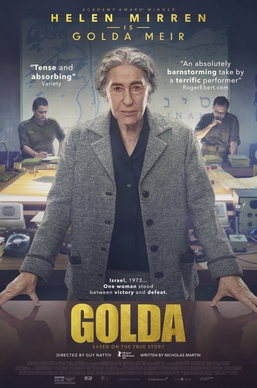GOLDA
No one can foresee the future. Golda, the film covering Israeli Prime Minister Golda Meir's tenure during the Yom Kippur War, was I figure meant to commemorate the fiftieth anniversary of that war. Instead, it comes on the heels of Israel's newest war of survival against Hamas. As a film, Golda moves well keeps things going, even if at times it becomes a bit heavy-handed with its symbolisms.
Using the narrative frame of an inquiry into the causes of the Yom Kippur War, we see a commission call an old woman into its chambers. That old woman is former Israeli Prime Minister Golda Meir (Helen Mirren). Various flashbacks take her to October 5, 1973.
While there are rumblings that Egypt will attack the Jewish state, Prime Minister Meir is dubious, as is her Defense Minister, the formidable eyepatch-wearing Moshe Dayan (Rami Heurberger). Almost too late, Meir sees that Israel will be attack and she orders a partial mobilization but no preemptive attack.
That may have been a poor decision, as Egypt and Syria launch a full-scale assault on Israel. Even Dayan is left horrified when he observes the Syrian troops from the air. He is close to losing his mind, but still Meir will not let him go. She also faces the grandiose military plans of Ariel "Arik" Sharon (Ohan Knoller) and the machinations of U.S. Secretary of State Henry Kissinger (Liev Schriber). Kissinger would rather want a negotiated settlement to not incur Arab wrath and keep the oil flowing. No dice for Meir: it is total victory and recognition of Israel by Egyptian President Sadat or nothing.
Unlike Kissinger and Sadat, however, Meir knows that she has a few cards up her sleeve, mostly the knowledge that in his eagerness to be the Arab leader to wipe the Jews off the planet, he is leaving Cairo undefended. The war ends with an Israeli victory but at a high cost for the secretly ill Meir.
In many ways, Golda is safe. Director Guy Nattiv and screenwriter Nicholas Martin do not delve deep if at all into Meir's troubled mind and/or soul on the war. It is kept mostly behind the scenes, particularly when Meir and/or her staff listen in on the various battles. Granted, Golda is not going to have scenes of her leading troops into battle across the Sinai. However, it also does not explore much if anything about Meir or those around her.
We know, for example, that Meir has an aide whose son is sent to the front. We pretty much know what that young man's fate will be. However, it felt almost as if both her aide and the son (one barely seen, one never seen) were there to "humanize" the war. Given the past horrors of the Shoah which she was fully aware if (even if she did not live through them herself), I do not think Meir went into this situation unaware of the human cost.
Golda also at times leaves things unanswered. The main unanswered sections involve Dayan. At one point, he was shaking so much that I wondered if he had Parkinson's Disease. He also appeared to be at times almost going mad. To be fair, the situation would be almost unbearable to those going through it. However, we still get something of a distance with everyone in Golda.
At times, there are stabs at drawing us into just how close Israel came to falling. Golda Meir at one point tells her secretary that if the Arabs manage to take Tel Aviv, she would not be taken alive. It was a good effort, but not a completely successful one. Golda also indulges in symbolism that is at times opaque and at times far too overt. One scene has her literally with blood-stained hands as a major operation is going on. The closing scene, for reasons I cannot fathom, has dead birds all around her hospital room.
Some of the acting is curious. Helen Mirren did not sound like Golda Meir. She sounded like Helen Mirren. Apart from that though, I think Mirren did well, though not great as Golda (I think Ingrid Bergman's performance in the television miniseries A Woman Called Golda was closer to the real Meir). Part of it is the script and directing, but part of it is with Mirren. Schrieber faces an uphill battle with Kissinger, as most actors focus on the late Secretary of State's distinctively accented bass voice. He did well, though again not great.
The film does have some positives. Dasha Dauenhauer's score worked well, particularly when Kissinger and Meir face off in Meir's kitchen.
On the whole, Golda is an acceptable film, not great, but could be a good primer into this tumultuous time in Israel's troubled history and the woman behind it.
_cropped.jpg) |
| 1898-1978 |


No comments:
Post a Comment
Views are always welcome, but I would ask that no vulgarity be used. Any posts that contain foul language or are bigoted in any way will not be posted.
Thank you.